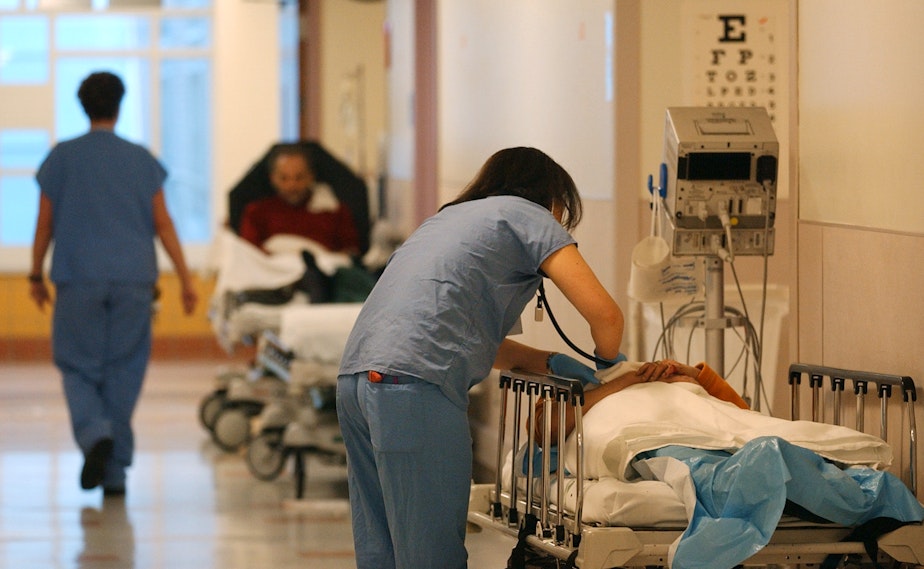What 'crisis care' could look like as WA hospitals surge with Covid patients

Hospitals across Washington are filling up with Covid-19 patients. The vast majority are unvaccinated. As a result, facilities have delayed some elective surgeries in a bid to free up resources.
And if those resources become too scarce, hospitals could be in a position to ration treatment — a situation known as crisis standard of care.
Dr. Vicki Sakata is an ER physician by training and a senior medical advisor for the Northwest Healthcare Response Network. She talked with KUOW's Kim Malcolm about crisis standards of care, and what hospitals are doing to prevent that situation.
This interview has been edited for clarity.
Dr. Vicki Sakata: This all has to do with how health care manages what we call [a] "medical surge," meaning the number of patients that need to be taken care of in a certain event. If you imagine a horizontal line, starting at the far left there's plenty of health care resources, and everybody affected by an acute event gets care. If you move to the far right of this horizontal line — at crisis standards of care —that's when we completely run out of a resource. Then you need to make really, really difficult decisions about who gets the care.
What kinds of resources are we talking about here? Is it equipment? Is it beds?
Right now, it's taking a toll on the amount of staff that are available. We always worry about things like ventilators or different types of medical equipment. But right now, we worry about not just the beds, but the staff able to take care of the patients that are in those beds. That's one of the resources that is very scarce at this point in time.
Under crisis standards of care, if there is one ventilator available, and two patients are in need of it: How does the doctor decide who gets it?
Sponsored
First of all, let's just say that no one wants to be faced with this difficult decision, and we're working very hard to avoid it. If it should come down to those types of choices, there needs to be really consistent guidelines on how this is done.
We do have national guidelines that Washington state has accepted and will follow. The important fact is that not one single clinician is going to make this decision. This decision needs to be made by a group. That's part of the state guidelines. We recommend that they are senior, experienced triage clinicians, and [the decision] also needs to include a medical ethicist. They will take into consideration consistent and unbiased clinical information only to decide which patients should get a resource.
What are hospitals doing right now to try to prevent this from happening?
Hospitals are trying to expand as much as possible to take care of patients. There are changes that are happening within healthcare systems that everybody needs to be aware of. Nurses may be taking care of more patients, or your elective procedure might be delayed. I'm sure many of your listeners have already experienced some of the changes that healthcare has to make in order to take care of this acute surge.
Do you think that we're going to get to the point here in Western Washington where we're operating under crisis standards of care?
Sponsored
The system right now is incredibly stressed. What is happening now is what we call "mitigation strategies" to keep us out of crisis. However, healthcare resources are not infinite. There is a point where there will not be enough. Right now there would not be, potentially, enough nurses or any kind of medical staff to take care of the patients that are needing care. When that happens, then yes, we will need to go into crisis standards of care.
Currently, we are experiencing a surge — but not a true disaster, per se. It would be a tremendously sad disaster if we went through this without learning the lessons from it that we need to learn, such as how our healthcare system has many gaps that need to be addressed, especially those around healthcare equity.
We also need to learn that everybody plays a part in this. If we go through this pandemic and haven't learned that we truly are our brother's keeper in many, many ways, then I think, sadly, it would be a disaster. However, I have faith in the human race. I have faith in our fellow citizens of Washington; that they will do the right thing and that we will be able to avoid a large catastrophe in our healthcare system, but it will take all of us.
You mean more people need to get vaccinated?
Yes, getting down to it: Everyone needs to get vaccinated. Everyone needs to wear a mask. Everyone needs to social distance. Through this all, we will get through it.
Sponsored
Listen to the interview by clicking the play button above.





